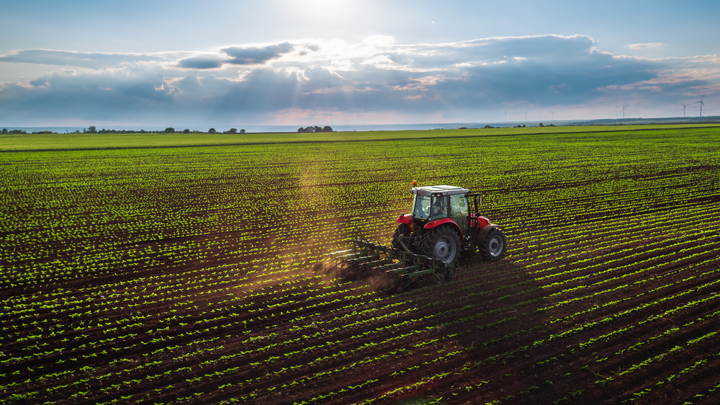IBISWorld presents a collection of fast facts for the different sectors of the UK economy.

Agriculture, Forestry & Fishing
-
Over 50 dairy farms across the UK have been appointed to join the newly launched UK Dairy Carbon network. Led by the Agri-Food and Biosciences Institute and funded by DEFRA, the project brings together top research institutions and industry organisations to work with farms to reduce emissions while improving farming efficiency. Work is underway to collect the carbon footprints of each participating farm, which will guide efforts to cut greenhouse gases throughout the three-year project.
-
Calls are growing for urgent action after British farming is on track for one of its deadliest years in a decade. Data from the Health and Safety Executive show that the number of farm-related deaths in the UK has risen to 17 since 1 April 2025. Industry bodies are calling for immediate improvements in safety attitudes and greater focus on training, regulation and cultural change after the tragedies.
-
The EU has warned the UK it must meet its commitment to check goods entering Northern Ireland before talks can begin on an agrifood trade deal. The agreement, expected by 2027, aims to establish a veterinary or sanitary and phytosanitary agreement to boost agrifood trade between the partners. Any proposed deal aims to reduce costs and paperwork for farmers exporting meat, dairy, eggs and plants to the EU, where UK agrifood exports have fallen since Brexit. Delays risk prolonging uncertainty and keeping trade barriers in place for producers across Great Britain, supplying Northern Ireland and EU markets.
-
Sentiment towards British farming is on the up as “Buy British” narratives take hold. The 2025 AHDB and YouGov survey reveals that 71% of consumers hold a positive view of British agriculture, up from 67% in 2024 and the highest level since the survey began in 2019. 58% of consumers say they are likely to seek out British food over imported alternatives, offering a welcome boost for a sector that has struggled with rising input costs, volatile commodity prices and competition from cheaper imports.
-
Extreme weather delivers a poor harvest, with farmers blaming heavy rainfall followed by prolonged dry spells for damaging yields. Provisional government data released in October show England’s 2025 barley harvest down 14% year on year, while spring barley output fell 23%.
-
A report published by McCain Foods in its inaugural Farmdex release in November highlighted the difficulties facing UK farmers. The survey found that 35% of farmers reported making no profit or only breaking even in the year to July, while just 14% said they achieved profits above 10%. Farmers pointed to continued post-Brexit pressures, including reduced subsidy support and challenging weather conditions, as key factors squeezing margins. Farmers blamed a mix of post-Brexit pressures, including shrinking subsidy support and tough weather conditions, for putting margins under strain.
-
Research carried out by advocacy group Sustain and reported by The Guardian found that intensive livestock “megafarms” are continuing to progress through planning without disclosing their full emissions. This is despite a 2024 Supreme Court ruling requiring all major developments to account for significant direct and indirect greenhouse-gas outputs. Of the 35 planning applications submitted since the ruling, none provided emissions data for the farms themselves, highlighting a major gap in environmental scrutiny.
-
Analysis from the Energy and Climate Intelligence Unit shows that record heat and drought cost Britain’s arable farms around £824 million in lost output in 2025. The losses follow the country’s hottest and driest spring on record and an exceptionally hot summer, which together pushed average yields of wheat, oats, spring and winter barley and oilseed rape roughly 20% below the 10-year average.
-
British dairy is gaining momentum abroad. AHDB figures show that UK dairy export volumes rose 5.5% in the third quarter of 2025, supported by higher shipments of powders, whey products, cheese and butter. This growth is being driven by targeted overseas initiatives. In November, Thai retailer TOPS hosted a two-week “Discovery UK” event that showcased British cheese and dairy to a consumer market that had previously been largely untapped.

Mining
- The Office for National Statistics reports that the mining and quarrying sector output dropped by 3.4% in September 2025. Output from the sector dipped by 1.5% in the three months to September 2025.
- World Bank Commodities Price Data released in December 2025 shows that the average Brent crude oil and WTI crude oil prices have dipped in November 2025 amid oversupply. Meanwhile, the International Energy Agency projected a record surplus in 2026, placing severe pressure on oil prices. This is backed by Goldman Sachs, which projects oil prices to decline through 2026 due to a production surge and a large surplus of two million barrels per day.
- World Bank Commodities Price Data released in December 2025 shows metals and minerals recording mixed results in November 2025. Some metals like aluminium, copper, lead, zinc and tin posted an increase, while iron ore and nickel dipped slightly. Meanwhile, gold and silver prices continued to rise, thanks to continued geopolitical tensions and economic instability.
- On 22 November 2025, the government launched the UK’s new Critical Minerals Strategy, which sets out a target to produce 10% of the UK’s mineral needs domestically and 20% through recycling by 2035. It also targets at least 50,000 tonnes of lithium to be produced in the UK by 2035. The strategy is backed up by up to £50 million in new funding, aiming to reduce the UK’s overreliance on foreign imports of critical minerals. The government aims to ensure no more than 60% of the UK’s supply of any one critical mineral is imported from any one country by 2035. The strategy has been welcomed by Cornish Lithium’s chief executive, Jamie Airnes, who states it will create UK jobs and boost manufacturing.
- ExxonMobil is to close its Fife Ethylene Plant in February 2026 due to challenging market conditions, including high supply costs and plant inefficiency, and the UK’s challenging policy environment. The planned closure of the chemicals plant will result in 200 job cuts.
- The UK government has confirmed an end to new North Sea oil and gas exploration, a move welcomed by Greenpeace and in line with manifesto commitments. However, drilling in the North Sea is set to continue. Nonetheless, the move to stop issuing new exploration licences has also been met with concerns related to jobs and energy security within the industry.
- Harbour Energy, the UK’s largest oil and gas producer, has announced plans to cut 100 offshore jobs amid the retention of the windfall tax following the Autumn Budget 2025.
- TotalEnergies has decided to merge its North Sea oil and gas assets with Neo Next to create the largest producer in the region, Neo Next+. This consolidation comes on the back of higher taxes, declining reserves and lower prices, as reported by the Financial Times.

Manufacturing
-
The Purchasing Managers’ Index (PMI) rose to 50.2 in November 2025, up from 49.7 the previous month, the first reading above the neutral 50 mark since September 2024. Output rose for the second consecutive month, driven by stronger domestic demand and a softer dip in export orders, alongside a stabilisation of new orders. Business optimism reached a nine-month high, with 56% of manufacturers expecting higher output over the next year, contributing to the positive reading.
-
UK vehicle production continues to reel from the JLR shutdown earlier in the year. SMMT data shows output fell 30.9% in the year to October, with car production down 23.8%. The slump reflects the lingering impact of JLR’s August stoppage, which has weighed heavily on production even as plants gradually ramp back up. There are tentative signs of improvement ahead. In November’s Budget, Chancellor Rachel Reeves extended the DRIVE35 programme, adding a further £1.5 billion to support the manufacture of zero-emission vehicles and help stabilise the wider automotive manufacturing sector.
-
Car manufacturers must meet a government mandate requiring 28% of new sales to be electric vehicles (EVs) by the end of 2025, with fines of up to £12,000 per non-compliant car. A report from the Society of Motor Manufacturers and Traders (SMMT), battery electric vehicle (BEV) registrations rose 3.6% year-on-year to November, following a 23.6% rise in the year to October 2025.
-
On 29 September 2025, Chancellor Rachel Reeves announced plans to classify shipbuilding as critical national infrastructure. The move follows an August agreement for Norway to procure UK-built Type 26 frigates from BAE Systems in Glasgow, a deal worth £10 billion to the UK economy. The contract is set to deliver a major boost for manufacturing, supporting more than 4,000 jobs and benefitting hundreds of British businesses across the supply chain.
-
The UK steel industry faces renewed pressure as the EU moves to halve its quota for tariff-free steel imports and impose 50% tariffs on any volumes above that limit. The move follows concerns that the European market could be flooded with cheaper steel redirected after the US imposed tariffs earlier this year. The EU remains the UK’s most important export market, with data from UK Steel showing that the bloc accounted for 78% of steel exports in 2024, posing fresh challenges for British producers. The blow comes just weeks after a proposed deal to remove US tariffs on UK steel was put on hold indefinitely in September, adding to uncertainty.
-
Chinese wind turbine maker Ming Yang Smart Energy announced plans to invest up to US$2 billion (£1.5 billion) in Scotland to produce key components for offshore wind projects, including turbine blades, nacelles and floating platforms. The move, subject to approval from the UK Government, is poised to create up to 1,500 jobs and could be in production by 2028.
-
A Make UK report published in October shows manufacturers are investing at their slowest pace since 2017, with spending on plant and machinery averaging 6.8 % of turnover in 2025, down from 8.1 % in 2024. Nearly 40% of companies cited uncertainty over tax incentives and allowances as a key factor holding back capital spending, alongside high borrowing costs and weaker demand.
-
The Department for Business and Trade has announced support for transitioning the Scunthorpe steelworks from blast-furnace operations to electric-arc furnace technology, marking a major shift in UK steelmaking. The scheme is designed to secure the future of production at the site, which has been under emergency state control since April. Ministers will draw on the £2.5 billion funding package committed in February to help decarbonise the UK steel sector and underpin long-term investment.

Utilities
-
UK energy bills are set to edge up 0.2% in January after Ofgem confirmed the new price cap. Households will pay an average of £1,758 a year from January to March, up slightly from the current level of £1,755. The modest rise reflects higher network and system upgrade costs, offsetting the slight fall in wholesale prices.
-
In October 2025, the CMA approved plans for Anglian, Northumbrian, Southern, South East and Wessex Water to raise bills by an additional 3%, totalling about £556 million over the next five years – a move that will push up costs for millions of households. This follows an average 24% climb permitted under Ofwat’s December ruling.
-
Audits commissioned by Ofgem on behalf of the Department for Energy Security and Net Zero have uncovered “unacceptably poor” work under the UK government’s flagship energy efficiency programme. Since 2022, 98% of external wall insulation installations and 29% of internal wall insulation fitted under the Energy Company Obligation scheme require corrective work, with many homes affected by damp and mould. The findings deal a significant blow to the UK’s energy efficiency agenda, undermining confidence in retrofit schemes and threatening to slow progress toward net-zero goals.
-
Britain’s domestic gas supply is set to shrink this winter, expanding reliance on imports. National Gas expects output from UK offshore fields to fall by around 6% this winter compared with last, as production from the North Sea basin continues to sink and environmental limits curb new exploration. Norway is expected to fill much of the shortfall, supplying an estimated 36% of Britain’s total gas over the upcoming period.
-
Sewage pollution and water outages have surged despite higher bills. New Ofwat data show total pollution incidents in England rose 27% between 2020 and 2025, despite water companies pledging to cut them by 30% over the same period. The regulator also found interruptions to water supplies increased by 8%, driven by burst mains and failures at treatment works.
-
The UK government has announced plans to create 400,000 additional jobs by 2030 for the clean-energy sector. Employment in renewables, including wind, solar and nuclear, is expected to double to 860,000, ramping up demand for 31 priority occupations, including plumbers, electricians and welders.
-
A November Financial Times report warned that a single-point failure at Thames Water’s Coppermills plant – which supplies up to four million Londoners – could cut off water for large parts of the capital. It exposes the depth of the company’s operational risks as it battles a near-£20 billion debt load. Thames Water says fixing the deteriorating Coppermills site would require £400 million in upgrades, showing the scale of investment needed to shore up its ageing network.
-
In November, Ofgem backed plans to develop a 1,500-mile core hydrogen network, approving £107 million in new funding and lifting its total commitment to £164 million, following an initial £57 million approved in June.
-
Ofgem has announced plans to overhaul its energy customer-service standards, including proposals to reshape its regulatory framework. The regulator is considering a shift to outcomes-based regulation, meaning suppliers would be expected to ensure that “every customer interaction leads to a positive result” as part of a wider push to raise service quality and strengthen accountability.
-
Ofgem approved an initial £28 billion of investment for the next five years to upgrade Britain’s gas and electricity networks. The decision marks the first phase of a broader £90 billion programme expected by 2031, aimed at modernising infrastructure and containing long-term costs for households.
-
The National Energy System Operator is axing hundreds of stalled electricity-generation projects to clear the grid-connection backlog. More than half the current pipeline will be removed, freeing space for around £40 billion worth of viable schemes that are better aligned with the government’s net-zero goals.
-
In November 2025, a water-quality failure at South East Water’s Pembury Treatment Works triggered a major outage, leaving 24,000 properties without supply or with very low pressure on the 29th. On 3 December, the company issued a boil-water notice requiring all drinking water to be boiled before use, highlighting ongoing problems.

Construction
-
The latest S&P Global release shows the UK Construction PMI fell to 39.4 in November, down from 44.1 in October and marking its fast rate of contraction since May 2020. The index has now been below the 50.0 threshold for 11 consecutive months, its longest continuous decline since the 2008 financial crisis. The marked downturn in November reflects the sharpest drop in new orders since May 2020, with construction companies citing weak client confidence and delayed spending ahead of the Budget.
-
The Atlantic Partnership for Advanced Nuclear Energy, announced in September 2025, is set to spark a flurry of activity in the UK construction sector. A collaboration between Holtec International, EDF Energy and investor Tritax will develop small modular reactors to power advanced data centres at the former Cottam coal-fired station. Holtec values the scheme at £11 billion and says it could create thousands of construction and operations jobs.
-
A report published by the Home Builders Federation in September warns the government that housebuilding in London is on the brink of collapse. The report highlights that a lack of buyer support, excessive bureaucracy and significant planning delays are "strangling" attempts to deliver new homes in the capital. This follows data from the Ministry of Housing, Communities & Local Government that shows decided planning applications in England dropped 2% year-on-year from January to March 2025, highlighting ongoing weakness.
-
The UK government has signed contracts to kick off the construction of two carbon capture and storage projects – at Heidelberg Materials’ cement works and at Encyclis’ waste-to-energy facility. Construction is expected to start in late 2025 and support around 500 jobs.
-
In October 2025, ministers took control of the £10 billion Lower Thames Crossing, removing oversight from National Highways and placing the project directly under the Department for Transport. The move aims to regain control over spiralling costs and timelines, signalling tighter central oversight of major infrastructure delivery.
-
Construction employment has sunk to its lowest level in almost 25 years. ONS data shows the workforce fell by 1.3% in Q3 2025 as the housing downturn, weak commercial activity and higher employment costs pushed firms to scale back. The sector’s workforce is now around 12% smaller than it was in Q3 2019, the last pre-pandemic benchmark.
-
Despite the wider slowdown, some firms are still proving resilient. Balfour Beatty, one of the UK’s largest construction groups, reported a projected 20% increase in its 2025 order book, supported by more than £3.5 billion of new power-generation and energy-infrastructure contracts.

Wholesale Trade
-
According to the Office for National Statistics, output in the wholesale trade, except of motor vehicles and motorcycles climbed by 1.7% in September 2025.
-
The Institute of Chartered Accountants in England and Wales’ Business Confidence Monitor reveals that retail and wholesalers remain among the least confident businesses in the UK in Q3 2025.
-
Co-op Wholesale has secured a five-year contract extension to supply all Ascona forecourts across the UK. This is an extension to an agreement that began in 2020, with the wholesalers to supply all 62 forecourts with grocery products, including Co-op's own-label items. In October 2025, The Grocer reported that Co-op Wholesale has further expanded its presence in the forecourt market by signing a multi-year agreement with Tankerford to become its primary supply partner for its 11 forecourt convenience stores.
-
World-leading cooling technology and HVAC wholesaler, Beijer Ref, has moved to consolidate by uniting its three UK businesses and rebranding its Irish operations (Dean and Wood, RW Refrigeration and HRP in England and DWG Refrigeration Wholesale in Ireland) to achieve efficiencies.
-
Lynas Foodservice, one of the largest family-run foodservice distributors across Northern Ireland, the Republic of Ireland and Scotland, has announced the acquisition of Scotland’s leading independent foodservice wholesalers, JB Foods. The move boosts Lynas Foodservice’s reach in Scotland.
-
Citing industry experts, The Grocer reports that AI tools could help wholesalers cut order processing time in half, enhancing efficiency.
-
Italian dairy conglomerate Granarolo, which has a UK subsidiary in the wholesale of dairy, has strengthened its UK market position following the acquisition of West Horsley Dairy, a wholesaler of dairy products to caterers, schools, restaurants and other independent clients in the south of England.
-
The Grocer reports that Boutinot, a Manchester-based wine wholesaler, has secured a £5.5 million funding package from HSBC UK, allowing it to expand vineyard operations in South Africa, New Zealand and the UK.

Retail Trade
-
The British Retail Consortium says the UK Budget was a “mixed bag” for retail, offering some relief but also new costs that will affect investment, hiring and prices. A permanent 5p reduction in retail business rates for properties below £500,000 was welcomed, but a new surtax on larger stores that employ around 1 million people drew criticism.
-
Retail employment costs have already risen due to higher National Insurance and wage increases, adding around £5 billion to costs and 100,000 jobs have been lost in the last year, the association notes. Changes to salary sacrifice and the delayed removal of the de minimis import threshold also add pressure.
-
The British Retail Consortium (BRC) has welcomed recent government changes to the Employment Rights Bill, notably updates to unfair dismissal provisions, saying they help protect jobs and employees and reflect productive dialogue between business, unions and government.
-
The BRC cautioned that other parts of the Bill, like guaranteed hours, could make it harder for retailers to offer flexible, part-time roles, which are widespread in the sector and urged continued engagement to ensure the legislation is workable for high-employment industries. Retailers want a realistic implementation timeline to safeguard employment opportunities while meeting new rights requirements.
-
The BRC reported Black Friday promotions started earlier than usual in 2025 as competition between retailers intensified, with widespread deals across health and beauty, electricals and fashion. Early discounting helped ease shop price inflation to 0.6% in November, down from 1% in October and non-food inflation fell to 0.6%, while food inflation eased to 3% year-on-year, though some categories like oils, meat and fish remained pricey thanks to input price inflation. Retailers hope this will boost consumer confidence during the crucial Christmas period, but rising employment costs could push prices up in 2026, adding pressure on already fragile demand.
-
The BRC reports UK retail footfall fell by 0.8% in November year-on-year, worsening from a 0.7% drop in October, as bad weather and “Budget nerves” discouraged shoppers from visiting physical stores. Month-on-month, high streets saw footfall down 1.2%, shopping centres 1.3% and retail parks 0.4%, while Northern Ireland bucked the trend with a 2.7% climb.
-
Poor conditions around Storm Claudia and uncertainty before the Autumn Budget, close to Black Friday, led to more consumers going online and a decline in in-store visits. It marked the seventh consecutive month of declining footfall, suggesting ongoing challenges for bricks-and-mortar retailers ahead of Christmas.
-
Consumer expectations for the state of the economy fell to -44 in November, from -35 in October, according to the BRC. Meanwhile, the outlook for personal finances worsened to -16 (from -11) and planned spending on retail goods dropped to +8 (from +14) in the same period. The weakening sentiment comes amid speculation over tax rises and inflationary pressures, signalling a potential headwind for retail and high-street spending heading into the Christmas period.
Transportation & Warehousing
-
A new pay-as-you-go rail ticketing system that monitors the location of passengers throughout their journey is set to be implemented on a trial basis in England. This initiative is part of a government effort to simplify the complex fare structure of the country's railway network. The pilot will first roll out on routes in the East Midlands, where travellers can check in for their journey using a mobile app that employs satellite technology to track their location. At day's end, passengers will be automatically charged the lowest applicable fare for their travel. If successful, the Department for Transport says this new system will replace traditional paper and mobile tickets that use QR codes, boosting efficiency in rail travel.
-
Coastal communities across the UK are set to benefit from over £1.1 billion in investment for the maritime sector. Announced on the first day of London International Shipping Week on 15 September 2025, the funding includes £700 million in private investment and £448 million in public funding. This investment will support the research and development of new clean maritime technologies and fuels to help reduce carbon emissions from shipping.
-
The UK’s Rail Minister has warned of growing driver shortages across train operators, urging companies to step up recruitment to avoid disruption. Of the 27,000 licensed train drivers in Britain (excluding Northern Ireland), the Aslef union estimates that around 22% of passenger drivers are due to retire within the next five years, raising the risk of widespread service shortages and increased pressure on operators to train new staff.
-
Pakistan International Airlines has resumed weekly flights to the UK after a five-year ban, following regulatory clearance from the UK Civil Aviation Authority. The first flight, from Manchester to Islamabad, took place on 25 October, marking the airline’s return after services were suspended in 2020 amid a scandal over fake pilot licences in Pakistan.
-
The Department for Transport has announced plans to extend contactless tap-in/tap-out payments to all London airports from December 2025. The upgrade is backed by around £18.7 million in government funding and will cover up to 50 stations across the South East, simplifying rail journeys for millions of passengers.
-
TfL has confirmed an update to the London Congestion Charge, which will rise from £15 to £18 from January 2026. As part of the overhaul, electric vehicles will lose their full exemption. Electric cars will qualify for a 25% discount, while electric vans, HGVs and quadricycles will receive a 50% discount when registered for Auto Pay.
-
Cycling is becoming a mainstream way to move around London. TfL data released in November shows that daily bike journeys have risen 43% since 2019, climbing from 1.05 million to 1.33 million in 2024. The shift reflects sustained investment in safer cycling lanes and shifting attitudes, which are transforming how Londoners commute and travel across the city.
-
The November Budget outlined plans to introduce a mileage-based road tax for electric vehicles and plug-in hybrids for the first time from 2028. Until now, tax incentives have encouraged drivers to move away from diesel towards cleaner alternatives, but as more people switch, fuel duty receipts are falling. That is putting pressure on the government to find new ways to fund the upkeep of Britain’s roads, prompting the shift towards a pay-per-mile system.
-
Train fares were frozen in the November Budget for the first time in 30 years, with no increase to season tickets, commuter peak returns or other regulated fares until March 2027.

Accommodation & Food Services
- ONS data reports that output in accommodation and food beverage service activities dipped by 0.01 percentage points in September 2025. Food and beverage activities dropped by 0.5% in September 2025, the second-largest negative contributor in consumer-facing services. In the three months to September 2025, output in accommodation and food service activities fell by 0.4%, with accommodation alone dropping by 1.1%.
- The Autumn Budget 2025 revealed that the National Living Wage will rise by 4.1% in April 2026 to £12.71 for those aged 21 and over, while the wage rate for 18- to 20-year-olds will climb by 8.5% from £10 to £10.85. These increases are higher than many expected, putting severe pressure on the hospitality sector, which is already experiencing significant labour troubles. The tax on alcohol, including draught drinks, will rise by the higher RPI rate of inflation in February 2026. The Budget has also revealed that local councils have been given the green light to introduce tourist taxes on overnight stays in English cities, which could hamper revenue for hotels.
- UKHospitality notes that overall, the wage increases announced in the Budget represent a total of £1.4 billion in additional costs for the hospitality sector, which it states will ultimately be passed on to the consumer, as hospitality businesses have reached their cost absorption limit. Further, it warns that the sector could lose another 100,000 workers due to the announcements made in the Budget.
- The CGA RSM Hospitality Business Tracker reveals that Britain’s leading managed restaurant, pub and bar groups extended a run of flat trading with like-for-like sales growth of just 0.1% in October 2025. Like-for-like sales in managed pubs were 1.9% higher from October 2024, while managed restaurants’ sales were down by 1.4% year-on-year and sales in managed bars dipped 5.9% in the same period. Pubs have outperformed restaurants and hospitality as a whole every month of 2025.
- Pubs’ working hours could be extended for the upcoming football World Cup in the summer of 2026, with reports stating they could stay open until 1am if a home nations reaches the quarter-finals or further. The BBC reports that the extension would only apply to England and Wales, as Scotland and Northern Ireland have separate licensing regimes.
- The Night Time Industries Association has suggested that nightclubs should become fan zones for the 2026 FIFA World Cup and hold screenings for matches as their existing licences already cover the majority of late kick-off times. This would provide a boost to the severely challenged industry.
- Fast food chain Yolk has fallen into administration after accumulating about £1.7 million in debt. The chain, which opened its doors in 2014, has been forced to close a number of sites in London after it underwent a company voluntary arrangement.
- The 2025 European Hotel Industry and Investment Survey by Deloitte has ranked London as the most attractive European city for hotel investment in the year ahead, topping the rankings for the third consecutive year. In the regional UK market, Edinburgh was placed as the most attractive for hotel investment for a fifth consecutive year, ahead of Cambridge, Oxford and Manchester. Additionally, nearly half of all executives surveyed also expected revenue per available room to climb between 1% and 3% across the UK. In terms of challenges facing the industry, workforce (83%), geopolitical tension (78%) and managing profitability (69%) were the biggest risks for the year ahead. 74% of those surveyed also anticipated the level of competition for hotel acquisitions to intensify in 2026 as hotels remain the most attractive hospitality asset class.
- According to RSM Hotels Tracker, based on data by Hotstats, UK hotel occupancy rate climbed from 82.8% to 85% in September year-on-year, with the rate reaching 87.2% in the capital. Average daily rates also climbed, driving an increase in gross operating profit, from 41% to 41.8% over the year.

Information
-
ONS data reports that output in the information and communication subsector expanded by 0.8% in September 2025. The growth during the month was mainly driven by motion picture, video and TV programme production, sound recording and music publishing activities, which grew by 5.4%.
-
BT’s Openreach warns that it could scrap its UK fibre target of 30 million by 2030 amid a dispute with Ofcom regarding the price curbs it has placed on the broadband provider.
-
EE has announced that its 5G SA network reach now covers 44 million people, equivalent to 66% of the population. The initial target laid out by the company was to reach 41 million people by spring 2026, equivalent of 60% of the UK population.
-
The Financial Times reports that UK broadband provider, Gigaclear, has launched a sale process amid a £1 billion debt pile. The provider serves about half a million homes, with about 160,000 customers.
-
The Financial Times reports that UK Chancellor, Rachel Reeves, has written to the leading UK telecoms to demand more protection for consumers from mid-contract price rises. This comes after Virgin Media O2 announced it would hike prices for its mobile customers by £2.50 a month from April, despite previously stating the increase would be £1.80.
-
Ofcom has fined Virgin Media £23.8 million for failing to protect vulnerable people when switching them from an analogue to a digital landline.
-
Aspire Technology Solutions, which connects 2,000 businesses and over 30,000 consumers across the UK, has secured a £200 million investment boost from existing private equity investor LDC and new minority co-investor Federated Hermes, as reported by ISPreview. The company has recorded a 158% rise in revenue since LDC’s original investment in 2022.
-
Large UK banks, including NatWest and Lloyds, have slowed new lending to the UK altnet sector, with many fibre broadband providers facing severe debt while battling high interest rates and low customer uptake.
-
The Financial Times reveals that the government is looking to enable regulators the powers to fine companies for failing to comply with cyber security rules, including a fine of up to 4% of their annual turnover of £17 million, whichever is larger.
-
In a boost to the UK creative industries, ministers have approved the £750 million Marlow Film Studios development in Buckinghamshire, which will include 18 sound stages alongside other film and television production facilities.

Finance & Insurance
-
Private medical insurance (PMI)-funded hospital admissions in the UK hit a record 338,000 in the first half of 2025, up 17% from 290,000 in H1 2019, reflecting growing reliance on insurance as the NHS waitlist tops 7.37 million people. PMI growth is slowing year-on-year, with admissions only slightly above 2024 levels, suggesting claims inflation may be cooling. This trend underscores expanding demand for health insurance products, shaping employer benefit strategies and expanding claims activity. Insurers and brokers face both opportunities from higher uptake and pressures from elevated claims and premiums as private care fills gaps left by NHS backlogs.
-
A November 2025 UK Finance report shows BNPL usage continues to grow rapidly, with 25% of UK adults using BNPL in 2024, up from 14% in 2023, with the average purchase now £114 and significant uptake across age groups, especially 25 to 34-year-olds and those aged 55 to 64. BNPL accounts for an increasing share of both online and in-store payments, accounting for around 8% of all purchases and forecast to rise further by 2030.
-
Regulatory change is imminent, with new FCA oversight and mandatory affordability checks expected by 2026, likely raising compliance costs but improving consumer protection. Expanding BNPL use drives product demand and revenue growth, while also increasing credit risk and the need for robust risk-management and underwriting strategies.
-
As of 8 December 2025, UK mortgage interest rates have fallen significantly, with some major lenders offering deals as low as 3.51% and average two- and five-year fixed rates dipping below 5%, their lowest since September 2022. This drop is driven by stronger competition among lenders in a subdued property market and expectations of a Bank of England base rate cut. Lower mortgage costs could spur borrowing and remortgaging activity, boosting lending volumes and supporting property transactions.

Real Estate and Rental and Leasing
-
According to Nationwide, annual house price growth increased by 1.8% in November 2025 compared with November 2024. Prices climbed by 0.3% month on month and the average house price stood at £272,998. Nationwide reports that the housing market shows resilience despite a backdrop of subdued consumer confidence and signs of a weakening labour market.
-
In the Autumn Budget 2025, the government announced that, from April 2028, properties in England worth over £2 million will face a council tax surcharge of £2,500, while homes over £5 million will pay £7,500 annually. Nationwide states that the “changes to property taxes announced in the Budget are unlikely to have a significant impact on the housing market”, as the surcharge will apply to less than 1% of properties in London and around 3% in London.
-
The Financial Times reports that, although the new property surcharge (the High Value Council Tax Surcharge) is said to bring in £600 million a year from 2028 to the Treasury, a move by homeowners to reprice properties below the £2 million threshold will "leave the Treasury £335 million worse off in revenue terms from existing property taxes in the next three years”.
-
The Budget also revealed an increase in the tax charged on rental income by two percentage points from April 2027. Nationwide stated that the “increase in taxes on income from properties may dampen the supply of new rental properties coming onto the market”, which could maintain upward pressure on rental growth.
-
Data from the ONS reveals that London house prices have dropped to their lowest levels in nearly two years amid ongoing affordability pressures. London’s average house prices have dipped by 1.8% in the year to September 2025, compared to a 2.6% increase across the country.
-
Based on data from Cushman & Wakefield, the Financial Times reports that New Bond Street in London has become the world’s most expensive location for retailers, with strong demand outpacing availability.
-
Investec’s Future Living survey, which gauges sentiment among 50 global institutional investors with over £300 billion of assets under management, has found that investor confidence in the UK commercial real estate market has taken a hit, with 76% of respondents citing political uncertainty as a driver of a weaker market.
-
According to CBRE data from October 2025, capital values for UK commercial real estate dipped by 0.2% in October 2025. Rental values climbed by 0.2%, with month-on-month total returns at 0.3%. Office capital values led the overall drop as they decreased by 0.7% in October, with both central London and the rest of the UK office capital values dipping by 0.1%. Meanwhile, the industrial and retail sectors saw capital values remain flat in October.
-
Real estate company Knight Frank forecasts that the City of London could see the vacancy rate for prime office space drop to zero by 2028 amid a lack of availability driven by a slowdown in construction and resurging demand.

Professional, Scientific & Technical Services
- ONS data reports that output in professional, scientific and technical services fell by 0.9% in September 2025, the largest negative contribution in the services sector. This was driven by a 4.9% decrease in scientific research and development.
- Analysis by the Financial Times states that the number of partner promotions at the Big Four accounting firms dropped to 179 in 2025, from over 200 in 2024 and from a peak of 276 in 2022. This comes as the firms focus on protecting profit amid a slowdown in consulting demand.
- The Accounting in the Age of AI 2025 report by Ravical reveals that 48% of UK accountancy firms plan to invest between £50,000 and £100,000 in AI over the next year as the industry adapts to rapidly advancing technologies and client expectations.
- Consultancy.uk reports that Palantir has chosen PwC as its partner to support the former’s clients with adopting its technology in AI transformations across the UK.
- The Audit Market and Competition Update published by the Financial Reporting Council in December 2025 states that non-Big Four firms have continued to expand their share of Public Interest Entity audit engagements, reaching 40% in 2024, up from 39% in 2023 and 22% in 2020. Nonetheless, the Big Four (PwC, Deloitte, EY and KPMG) continue to dominate the market. Meanwhile, from 29 FTSE 350 companies changing their auditor, all switched from one Big Four firm to another.
- As competition for talent intensifies in London, the Financial Times reports that “law firms are seeking to differentiate themselves beyond pay”, offering various office perks like health food and juice bars to win the talent war. Meanwhile, the world’s largest law firm by revenue, Kirkland & Ellis, moved to a new office in London in 2025, which offers saunas, a hair salon and a large library, in a bid to retain talent.
- Magic Circle law firm Clifford Chance has announced plans to cut 10% of its business services staff in London due to a slowdown in demand for some services and greater use of AI.
- A survey of 1,680 lawyers at 110 top UK law firms conducted by legal rankings company Chambers and Partners has found that two in five associates plan to leave their jobs in the next five years amid significant stress and insufficient support from their employers.
- WARC estimates that UK gambling firms spent close to £2 billion on advertising and marketing last year, an estimate which has been disputed by the Betting and Gaming Council, which claims ad spend was closer to £1 billion.
- In a shake-up of the criminal court system, the government projects that nearly half of all jury trials will be heard by magistrates or a judge in an attempt to tackle court delays and a significant backlog of cases. However, the chair of the Criminal Bar Association, Riel Karmy-Jones KC, warns that the plans to curb jury trials and establish a new, lower tier of juryless courts threaten to expose judges to intimidation, as reported by the Financial Times.
- Leading UK broadcaster ITV has warned that it expects a significant drop in advertising revenues in the final quarter of the year as businesses cut spending ahead amid heightened uncertainty caused by the Autumn Budget.
The government has announced new funding to boost the UK life sciences sector, with the launch of a new life sciences hub located in London, which is expected to attract over £800 million in investment.

Education
-
Analysis by Universities UK (UUK) reveals that funding per undergraduate in England is now only 64% of what it was in the 2015-16 academic year after inflation. In cash terms, this equates to approximately £6.4 billion less spent on teaching for current students compared with a decade ago.
-
According to analysis published by the Office for Students in November 2025, 41% of UK Universities are expected to report deficits in 2026-27, even after inflation-linked rises in tuition fees, reflecting deep financial stress in the sector. This comes amid longer-running funding pressures, stagnant government support and volatile student recruitment, especially from overseas. The mounting deficits are likely to drive course cuts, staff redundancies and institutional restructuring, threatening research capacity and academic jobs. Ongoing financial strain may also weaken global competitiveness and constrain investment in facilities and innovation, with broader implications for UK higher education’s role in skills development and scholarly output.
-
UK universities are restricting recruitment of Bangladeshi and Pakistani students after the Home Office tightened visa rules for “high-risk” countries, prompting at least nine institutions to pause or limit applications to manage compliance and immigration risk. This shift threatens international student pipelines that many universities depend on financially and culturally, especially amid wider funding pressures in UK higher education. Lower recruitment from key markets could reduce tuition income, exacerbate budget shortfalls and undermine research and teaching resources, reinforcing calls for regulatory and funding reform to sustain the sector’s global competitiveness.
-
The UK government has launched a new programme to cap agency staff mark-ups in schools, aiming to reduce the £1.4 billion spent on agency staff in 2023-24 by limiting how much supply agencies can charge and providing updated digital tools to help schools benchmark costs and secure better deals.
-
Schools and trusts are expected to save “millions over this Parliament”, allowing more funding to be redirected to frontline education and technology investment. The initiative also encourages better use of the £6 billion in school reserves and forms part of wider efforts to maximise budget value and reinvest savings into pupils’ learning and outcomes.
-
Wealthy British parents are increasingly looking to boarding and private schools in continental Europe as UK independent school fees have risen sharply, jumping by up to 22.6% following the Labour government’s introduction of 20% VAT on fees from January 2025.
-
German schools report being “inundated” with enquiries, as their annual costs can be significantly lower than UK boarding fees, prompting some families even to relocate. The shift signals potential pressure on the UK private school market, as higher costs and reduced affordability drive demand abroad and could influence future choices in schooling and educational investment decisions.

Healthcare & Social Assistance
-
The UK government has agreed £1 billion in funding to allow around 18,000 NHS administrative staff and managers to be made redundant, cutting “unnecessary bureaucracy” across NHS England, the Department of Health and local health boards.
-
The Treasury has permitted the NHS to overspend its current budget this year to cover the one-off cost, to be recouped later. The cuts form part of wider restructuring, including planned changes to Integrated Care Boards and aim to free up funds for frontline services. For the health and social care sector, this could strain back-office capacity, slow administrative functions and impact planning and coordination at a time of ongoing workforce pressures.
-
The Nursing and Midwifery Council has reported a steep drop in overseas nurses and midwives coming to the UK, with only 6,321 joining the register between April and September 2025, compared with 12,534 in the same period in 2024. More international staff are also leaving, with racism and recent immigration rule changes cited as key factors. This sharp decline threatens workforce stability, intensifies existing staffing shortages and increases pressure on services. NHS Employers warned that the data underscores the need for inclusive employment practices and serves as a crucial alarm bell ahead of the ten-year workforce plan.
-
A new Healthwatch England study finds 14% in England are being lost, delayed, rejected or never sent, creating a “referrals black hole” between GPs and hospitals. Seven out of 10 patients affected only discover the issue after chasing NHS staff themselves. While 62% are satisfied with the referral process, 23% are dissatisfied and the problem has improved from 21% in 2023. Patients left without referrals risk deteriorating health, increased anxiety and prolonged waits for diagnosis or treatment, adding pressure to already stretched NHS services. Healthwatch urges action to improve communication, referral systems and patient safety.
-
Record numbers of overseas-trained doctors are leaving the UK, creating growing risks for NHS workforce capacity. New General Medical Council (GMC) data shows that 4,880 internationally qualified doctors exited the UK in 2024, a 26% increase from 3,869 in 2023. The GMC, NHS leaders and senior clinicians attribute the rise partly to worsening hostility and abuse directed at migrants.
-
Danny Mortimer, chief executive of NHS Employers, noted that the NHS is trying to balance opportunities for UK graduates with the needs of overseas-trained staff while shifting more care into community settings. The departure of so many international doctors threaten to deepen staffing shortages across health and social care, increase pressure on remaining clinicians and undermine service delivery in already stretched neighbourhood and community services.
-
The HM Treasury and Department of Health & Social Care have announced that the cost for an NHS prescription in England will remain frozen at £9.90 in the next year. This freeze is expected to save patients around £12 million in 2026. Around 89% of prescriptions are already dispensed free (for children, over-60s, pregnant women and those with certain medical conditions).
-
In terms of the UK health & social care sector, maintaining this cap helps protect low-income and vulnerable patients from skipping medications due to cost, which could reduce avoidable hospital admissions and help ease pressure on NHS resources. Meanwhile, freezing charges signals that government-cost pressure on the NHS is being balanced against cost-of-living concerns, but also underscores that sustainable funding and workforce planning remain critical to ensure care provision is maintained.
-
The government has announced that around £1 billion a year will be saved by cutting bureaucracy in the NHS England and reinforcing its integration with the Department of Health and Social Care – part of a wider efficiency initiative expected to free up £17 billion over three years. These savings are aimed at redirecting funds into frontline patient care –for example, every £1 billion saved is equated to funding an extra 116,000 hip and knee operations. The reform also involves abolishing around 18,000 administrative posts, focusing power at local levels and strengthening neighbourhood health services. For the UK health & social care sector, this signals a strong push to reduce overheads, improve efficiency and prioritise investment in direct care, potentially improving access and outcomes, but dependent on effective implementation and maintaining the quality of administrative support.
-
NHS England have consistently missed NHS waiting time targets according to research and analysis conducted by Cancer Research UK. In September 2025, just 73.9% of patients were diagnosed or had cancer ruled out within 28 days of an urgent referral, against a target of 75%. Meanwhile, only 67.9% began their first treatment within 62 days of referral (target 85%). On the 31-day decision-to-treat standard, 91.2% of patients started treatment within the benchmark (target 96%). These persistent shortfalls point to systemic strain – delays in diagnosis and treatment may reduce chances of successful outcomes. One study cited a four week delay in surgery was linked with a 6% to 8% increased risk of death. For the UK’s health and social care sector, this signals escalating pressure on cancer services and the urgent need to address capacity, workforce and process bottlenecks so that early detection and timely treatment are not compromised.

Arts, Entertainment & Recreation
-
MPs on the Treasury Select Committee have urged Chancellor Rachel Reeves to increase taxes on high-risk gambling activities, including online casino games and high-street slot machines, within the UK gambling industry. They argue the sector’s current tax regime fails to reflect the varying levels of harm and warn against industry “scaremongering” over job losses and economic impact. The proposed higher duties could reduce the funds gambling firms currently channel into sport and leisure sponsorship, including in arts, culture and recreation and may shift spending away from these sectors if the industry scales back its partnerships. Cultural organisations reliant on such revenue face potential funding pressure.
-
Everlast Gyms has partnered with global fitness race brand Hyrox to open 60 Hyrox Performance Centres across the UK and Ireland by 2028, transforming gyms into experiential training hubs featuring competition-grade equipment and dedicated race-style classes. The move marks a significant evolution in the recreation landscape, blending fitness, entertainment and community engagement. For the wider arts, culture and recreation sector, it highlights a growing shift towards immersive, performance-led experiences that attract diverse audiences and new sponsorship models. As consumers increasingly seek participatory, event-driven activities, this expansion could spur innovation across leisure venues while intensifying competition for public engagement and funding within the broader cultural and recreational ecosystem.
-
In September 2025, the Wolfson Foundation and Department for Culture, Media & Sport (DCMS) launched a new round of the “Museums and Galleries Improvement Fund”, offering £4 million in capital funding for regional museums and galleries across England. The scheme, half funded by DCMS and half matched by the Wolfson Foundation, aims to improve accessibility of collections, upgrade exhibition spaces and enhance visitor accessibility, including features like accessible signage and “Changing Places” toilets. This means more venues will be able to remove physical and experiential barriers, potentially increasing audience reach, boosted community engagement and improved equality of access to cultural provision across the regions.
For more information on any of the UK’s 600+ industries, log on to www.ibisworld.com, or follow IBISWorld on LinkedIn.








